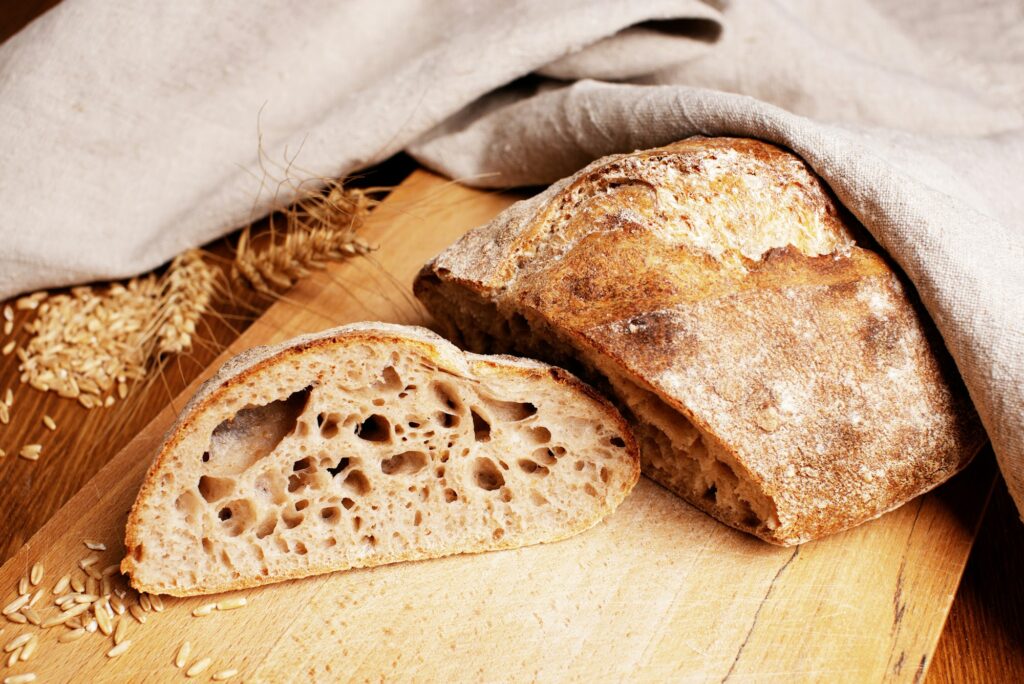Sourdough bread, a cherished staple across cultures, holds a special place in the world of artisanal baking. Its unique character comes from a traditional fermentation process, a method that sets it apart from standard bread varieties. This process is not just about leavening the dough; it’s about nurturing a complex ecosystem of wild yeast and lactic acid bacteria. These microscopic artisans work in harmony to pre-digest the flour, transforming it into a bread that’s not only flavorful but also full of health benefits. The aim of this comprehensive exploration is to uncover why sourdough bread is easier on your stomach. We’ll delve into sourdough bread benefits, intricacies of its fermentation process and nutritional content, shedding light on the digestive advantages sourdough offers.
The Science of Sourdough: Basis of Sourdough Bread Benefits
Fermentation Process
At the heart of sourdough bread’s allure is its fermentation process, a natural collaboration between wild yeast and lactic acid bacteria. This partnership not only raises the dough but also imparts a distinctive taste and texture, setting sourdough apart from its commercially yeasted counterparts. The fermentation process goes beyond mere leavening; it acts as a pre-digestion phase where the complex carbohydrates in flour are broken down. This breakdown is crucial, as it leads to a reduction in antinutrients and makes the bread more digestible. Unlike quick-rise breads that depend on commercial yeast for leavening, sourdough’s gradual fermentation allows for this beneficial transformation, making it a friendlier option for your digestive system.
Role of Phytase Enzymes
The fermentation of sourdough unleashes phytase enzymes, pivotal in enhancing the bread’s digestibility. These enzymes target phytic acid, a natural substance in grains that can block the absorption of essential minerals in your body. By neutralizing phytic acid, sourdough ensures that minerals such as iron, zinc, and magnesium are more bioavailable. This enzymatic activity is a key factor in why sourdough bread can be easier on your stomach, promoting not only easier digestion but also improved nutrient uptake.
Sourdough Bread Benefits for Health

Lower Gluten Content
The natural fermentation process of sourdough involves a symbiotic relationship between wild yeast and lactic acid bacteria. This relationship is not only crucial for the bread’s leavening but also plays a pivotal role in breaking down gluten proteins. During fermentation, the proteolytic enzymes produced by these microorganisms gradually degrade gluten, which is a complex protein found in wheat and other grains. This breakdown process can result in a bread that contains lower levels of gluten compared to breads made with commercial yeast and quick-rise methods.
While the reduction in gluten content does not make sourdough bread completely gluten-free, it may make it more tolerable for individuals with non-celiac gluten sensitivity. People with this sensitivity can experience bloating, gas, diarrhea, or fatigue when consuming gluten. The decreased gluten levels in sourdough might mitigate these adverse effects, offering a more comfortable eating experience for those sensitive to gluten. However, it’s essential to note that sourdough bread is not suitable for individuals with celiac disease, as it still contains gluten, albeit in potentially reduced amounts.
Weight Management
Sourdough bread has a unique texture and density, factors that contribute to its ability to increase feelings of fullness and satiety. When compared to more refined breads, the complex carbohydrates and dietary fiber found in sourdough take longer to digest. This slower digestion process can help you feel fuller for longer periods, potentially reducing overall calorie intake by minimizing the desire for additional snacking or overeating at meals.
The lower glycemic index (GI) of sourdough bread is another factor that supports weight management. Foods with a lower GI are digested and absorbed more slowly, leading to a more gradual rise in blood sugar levels. This can help in controlling appetite and reducing sudden hunger spikes, which are often followed by overeating. Maintaining stable blood sugar levels is crucial for avoiding the cycle of binge eating and fasting, which can lead to weight gain over time.
Versatility and Flavor
Sourdough bread’s unique flavor arises from the fermentation process, where lactic acid bacteria produce acids that give the bread its characteristic tang. This tanginess can range from mild to sharp, depending on the length of the fermentation. The depth of flavor sourdough offers is unmatched by yeast-based breads, providing a complex taste that can enhance both savory and sweet dishes.
The rich flavors and versatility of sourdough also contribute to its nutritional value, making it a healthier choice without compromising taste. The fermentation process not only enhances its digestibility but also its nutrient profile, allowing for a guilt-free enjoyment of bread in various forms.
Environment Friendly
The production of sourdough bread typically requires less energy compared to commercial bread-making processes. Sourdough fermentation is a slower process that relies on the natural activity of wild yeast and bacteria, eliminating the need for electrical mixers or dough conditioners that are commonly used in the production of conventional breads. This reduction in energy consumption contributes to a smaller carbon footprint associated with sourdough bread.
Sourdough bread is made from a simple list of ingredients: flour, water, salt, and the starter culture. This simplicity contrasts with many commercial breads that contain additives, preservatives, and conditioners to extend shelf life, enhance texture, or expedite the rising process. The use of fewer and more natural ingredients reduces the demand for various chemicals and additives, which often have a higher environmental impact in terms of production, transportation, and packaging.
Nutrient Absorption
The fermentation process that defines sourdough bread production involves the cultivation of beneficial lactic acid bacteria (LAB). These bacteria play a crucial role in predigesting the flour’s starches and proteins, including gluten. This predigestion process not only helps to break down potentially troublesome compounds but also contributes to the production of beneficial compounds like organic acids. The presence of these acids can create a more favorable pH in the gut, encouraging the growth of good bacteria and contributing to a balanced microbiome. A healthy gut microbiome is essential for overall digestive health, aiding in the efficient breakdown and absorption of nutrients while also supporting immune function.
Sourdough bread is also noted for its prebiotic content, which feeds the beneficial bacteria in the gut. Prebiotics are a type of non-digestible fiber compound that help promote the growth of healthy gut bacteria. A diet rich in prebiotics can improve gastrointestinal health, support regularity, and enhance the immune system.
Digestive Health
Sourdough’s benefits extend notably to digestive health. Its status as a prebiotic feeds and supports a healthy gut microbiome, fostering beneficial bacteria while keeping harmful ones at bay. This prebiotic action is vital for maintaining a balanced digestive system, leading to reduced bloating and less digestive discomfort. Moreover, the slow breakdown of sourdough’s carbohydrates prevents the rapid sugar spikes associated with more refined breads, contributing to smoother digestive processes and a more satisfying eating experience.
Blood Sugar Management
Blood sugar management is another area where sourdough shines. Thanks to its low glycemic index, it’s metabolized more slowly, moderating blood sugar levels and insulin response. This slow absorption is particularly beneficial for individuals managing diabetes or looking to maintain stable energy levels throughout the day. By opting for sourdough over higher-glycemic alternatives, you’re choosing a bread that not only tastes great but also supports healthier blood sugar regulation.
The exploration of sourdough’s benefits reveals a bread that is not only delicious and artisanal but also kind to our digestive systems. Through its natural fermentation process, sourdough offers improved nutrient absorption, enhanced digestive health, and effective blood sugar management. These factors contribute to why sourdough bread is a preferable choice for those seeking a stomach-friendly bread option.
Sourdough Bread Benefits vs. Other Breads
When comparing sourdough bread to other bread types, its unique benefits become evident, largely thanks to its fermentation process. This traditional method of making sourdough not only contributes to its distinct tangy flavor but also to several health advantages that are less prominent in other breads.
Digestibility:
The natural fermentation process inherent to sourdough involves a pre-digestion of the dough. This process breaks down gluten, making sourdough a potentially easier option for individuals with gluten sensitivities (though not for those with celiac disease). The reduction in gluten can alleviate common issues like bloating and gas, making sourdough a friendlier option for sensitive stomachs.
Nutritional Enhancement:
Unlike commercial breads, which often rely on additives for flavor and preservation, sourdough’s flavor and preservation come naturally from its fermentation. This not only eliminates the need for unnecessary chemicals but also enhances the bread’s nutritional profile by increasing the availability of key nutrients.
Blood Sugar Regulation:
Another significant benefit of sourdough is its effect on blood sugar levels. Thanks to the action of lactic acid bacteria, the starches in the bread are altered, leading to a lower glycemic index compared to conventional breads. This slower absorption of glucose into the bloodstream can be particularly beneficial for individuals with diabetes or those looking to manage their energy levels more effectively throughout the day.
Making Sourdough: Art and Science
The process of making sourdough bread is a fascinating blend of artistry and scientific principles. The artisanal process requires not only a thorough understanding of baking techniques but also an appreciation for the microbial activity that characterizes sourdough’s fermentation.
Natural Fermentation:
The essence of sourdough lies in its reliance on the natural environment for fermentation. This involves cultivating a starter culture that contains wild yeast and lactic acid bacteria. The complex interplay between these microorganisms and the dough’s ingredients gives sourdough its unique characteristics. Bakers must monitor various factors, such as ambient temperature and humidity, to ensure successful fermentation.
Slow Fermentation:
Unlike commercial bread-making processes that prioritize speed and uniformity, sourdough fermentation is a slow, nuanced process. This extended fermentation period not only develops the bread’s flavor but also its nutritional and digestive benefits. The patience required in sourdough baking is a testament to the baker’s craftsmanship and dedication to quality.
Sourdough for Special Diets: Additional
Sourdough Bread Benefits
Sourdough’s unique properties make it a suitable choice for various dietary needs, offering an alternative to those who might struggle with conventional bread.
- Low Glycemic Index: The lower glycemic index of sourdough is a boon for individuals monitoring their blood sugar, such as those with diabetes. This attribute helps in maintaining more stable blood glucose levels, contributing to overall health and well-being.
- Gluten Sensitivities: While not gluten-free, the process of fermentation in sourdough can break down some of the gluten, making it more digestible. This can make sourdough a more comfortable option for people with non-celiac gluten sensitivities. However, it’s important to note that sourdough is not suitable for those with celiac disease, as it still contains gluten.
Incorporating Sourdough Into Your Diet

Integrating sourdough into your diet can enrich your meals with its unique taste and health benefits. Here are some practical suggestions:
- Start with Toast: A simple and delightful way to enjoy sourdough is by beginning your day with sourdough toast. The robust flavor of sourdough pairs wonderfully with various toppings, from creamy avocado to rich almond butter, offering a nutritious and satisfying breakfast option.
- Sandwiches and Paninis: Elevate your lunchtime sandwiches and paninis by using sourdough bread. Its sturdy texture and tangy taste enhance the flavors of both classic and innovative sandwich fillings, making your midday meal both healthful and delicious.
- Croutons and Breadcrumbs: Transform stale sourdough bread into crunchy croutons for soups and salads or into breadcrumbs for coating or stuffing. This not only reduces food waste but also adds a flavorful twist to your dishes.
- Creative Snacks: Experiment with sourdough by making savory or sweet snacks. Try sourdough slices topped with peanut butter and banana or a savory version with hummus and cucumber for a quick, healthful snack.
FAQs
Q: Can sourdough help with digestion?
A: Yes, sourdough’s fermentation process makes it more digestible compared to regular bread. The lactic acid bacteria present in sourdough help break down the gluten, making it easier on the stomach and improving overall digestive health.
Q: Is sourdough bread good for blood sugar control?
A: Sourdough bread has a lower glycemic index than most commercial breads, meaning it can help maintain more stable blood sugar levels. This slower absorption of sugar into the bloodstream is beneficial for those monitoring their blood sugar or managing diabetes.
Q: Can people with gluten sensitivity eat sourdough?
A: People with non-celiac gluten sensitivity may find sourdough to be more tolerable than other types of bread, thanks to the fermentation process that breaks down some of the gluten. However, it’s important to note that sourdough is not gluten-free and is not suitable for individuals with celiac disease.
Conclusion:
In conclusion, sourdough bread is not just a culinary delight; it’s a healthier alternative to conventional breads, offering benefits like improved digestibility, enhanced nutrient absorption, and better blood sugar management. By incorporating sourdough into your diet, you can enjoy its unique flavor while also taking advantage of its health benefits. Whether you’re making a simple toast for breakfast or a gourmet sandwich for lunch, sourdough is a versatile and nutritious choice that supports a healthy lifestyle.

